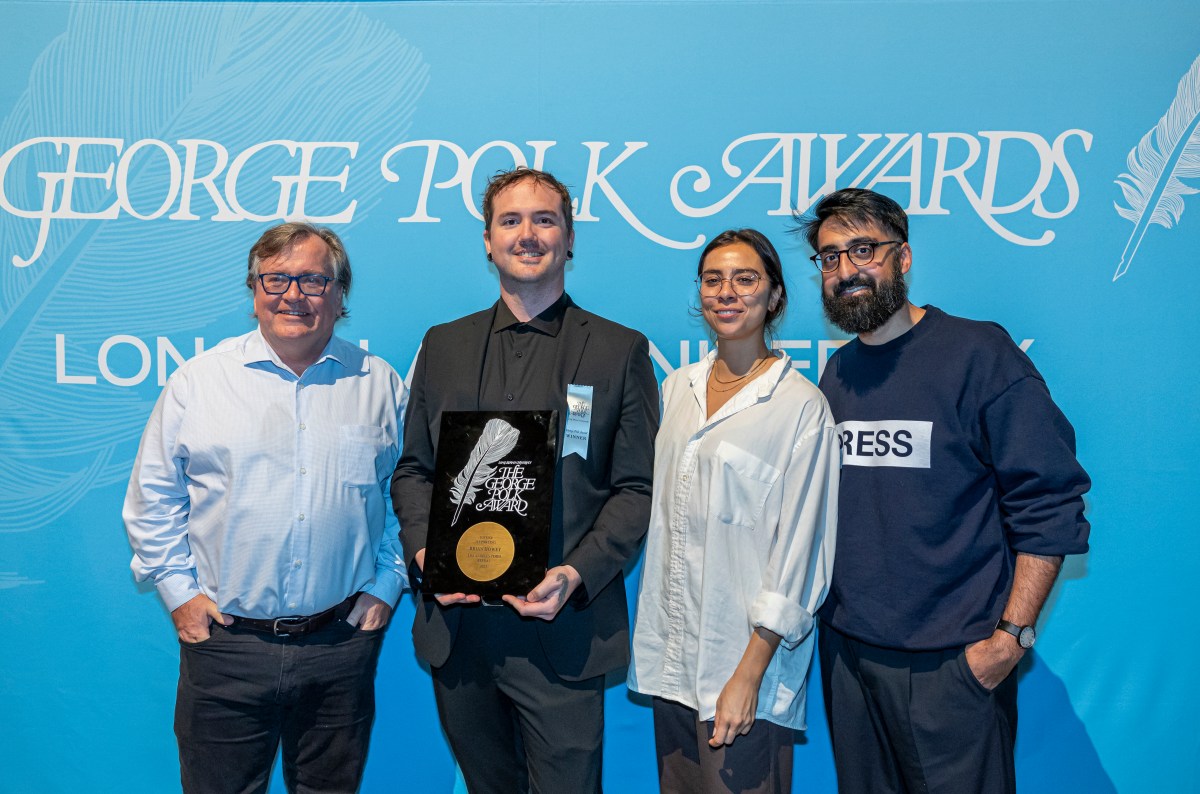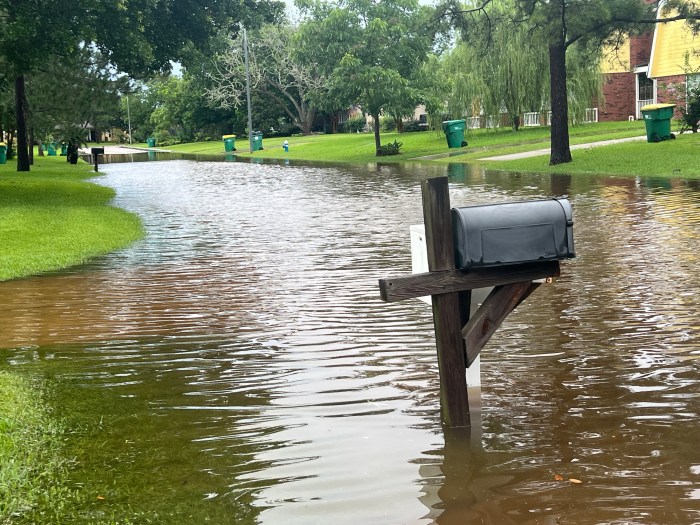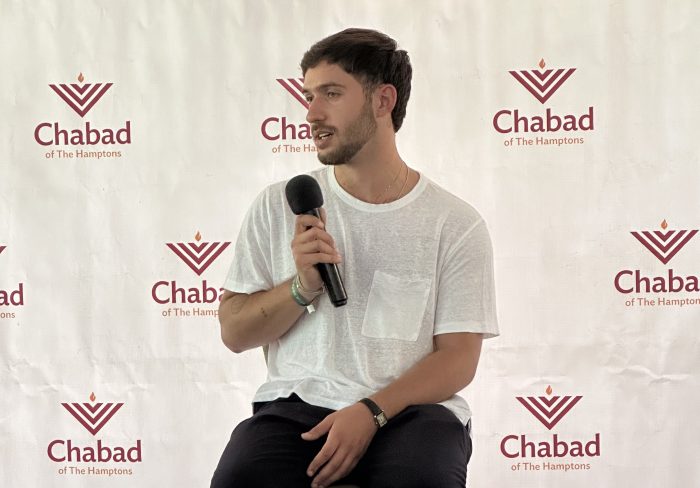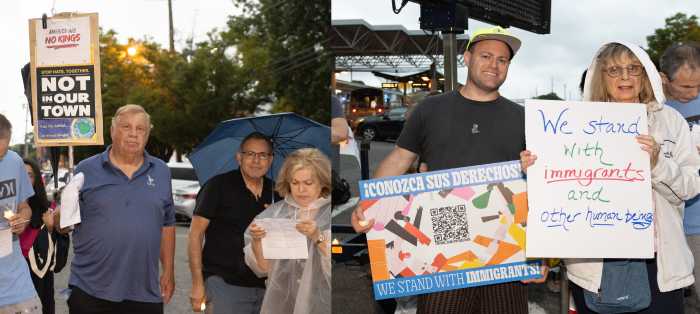The winners of recognition for investigative journalism took the stage recently at the 75th George Polk Awards, which also honored previous winners.
Reporters from The New York Times, The Washington Post, The Associated Press, ProPublica, CNN and others were honored for work ranging from wars to malfunctioning medical devices. Sometimes called a kind of Oscars for investigative reporting, the Polk awards provide a window into the world of investigative reporting. Anderson Cooper emceed the event at Cipriani, in Manhattan. And 17 laureates from the past, from Carl Bernstein to Christiane Amanpour, took a bow. But if these awards, created in 1949 by Long Island University, also honored a storied past, some moments pointed toward the future.
Brian Howey, for instance, received the justice reporting award for work he started while studying at the University of California Berkeley Graduate School of Journalism’s investigative reporting program. He started looking at the Los Angeles Police Department’s manual, hardly riveting reading and something he described as “one of the most boring documents ever read” – boring, that is, until he found that, after shootings by police, officers quickly sought to interview families of those who had been shot.
“They would contact the families of people killed by police before they learned a relative is dead and grill them about their relative’s drinking, drug use and mental health issues,” Howey told the Press. “And then later, they would use that information against the family when they sued for the wrongful death.”
Investigation generation
Howey, who now does local investigations for The New York Times, is part of a new generation of investigative journalists. Some pursued the path after 9/11, others focused on healthcare after the pandemic, and still others are rebelling against social media’s recalcitrance when it comes to truth. In his speech, Howey thanked “the families who trusted the telling of the worst moments of their lives to a stranger.”
At a time when there is a huge deficit of trust, when journalism is under attack, newspapers are cutting back and publications are in limbo between digital and print, the Polks, held by Long Island University, shows that despite all this, investigative reporting truly is alive and well. The Pulitzers are huge prizes for writing, but Polks are exclusively journalism. New Yorker Editor David Remnick pointed out that the awards are named for a journalist, not a funder, publisher or other. Even amid an onslaught on fact, investigative journalism, along with jazz, remains a truly American art form.
“I think we’re in a transition period,” Remnick said at the event that included video as well as statements in person. “An old model in many ways has collapsed. A new one has yet to be reborn.”
Winners have included Gay Talese, Walter Cronkite, Murray Kempton, Susan Sontag, Joan Didion and others for the awards LIU named for journalist George Polk, who was murdered in 1948 while covering the Greek Civil War. “George Polk’s name is still spoken with the deepest respect,” CBS News President Ingrid Ciprian-Matthews said. “He gave his life in service of the truth.”
Journalists’ work ranged from war to healthcare and high tech, sometimes spawning controversy, but the Polks sought to reward courage, candor and commitment – a belief that truth is not always on the shiny surface, but sometimes beneath it undergirds journalism. “This is a grim time in our profession. Many newspapers and news outlets have closed,” John Darnton, who curates the awards (and won two), said. “You can’t help but be struck by the fact that there are plenty of good journalists are out there, doing great work.”
A Reuters staffer called this “a time of great upheaval in our industry.” CEO of Tesla and SpaceX Elon Musk said Reuters should get the “liar of the year award” for its coverage of his companies, although the global news agency won a Polk award. But there clearly was, at least for a day, a true sense of community for investigative reporters.
“A lot of projects, you’re pulling together a team,” Martin Baron, former executive editor of The Boston Globe and Washington Post, said regarding audio, video, graphics. “There’s a whole room full of people there.”
Some criticized social media for spreading lies and competing with vetting by journalists, editors and fact checkers. When you don’t fact check, information can spread faster and be false. “We really did fail to regulate social media,” CNN Chief International Anchor Christiane Amanpour, a laureate, said. “The government failed. Private markets failed. It really has harmed us. There is an exponential tsunami of disinformation.”
Living in a 24/7 news world, in which opinion sometimes fills in for facts, may be a double-edged sword. While there is more talk about news, that doesn’t mean that swath is wider or deeper. “I believe Ted Turner [founder of Cable News Network (CNN), the first 24-hour cable news channel], was so fervent about his mission, his belief, his commitment,” Amanpour said. “He wasn’t there just to make money. He had a mission and we believed in that mission.”
With a world full of wars flaring up, numerous war correspondents were honored from Gaza to Ukraine for past and present work. “Do I do this because of the danger? No,” Lynsey Addario, a laureate honored in 2023, asked. “I’m not there for the adrenaline rush. I’m there because I fundamentally believe in journalism.”
Many talked about the financial pressures local journalists and publications face. Some publications have gone under, while others cut back. “The thing that gives me the most concern is the decline of local journalism,” said Dean Baquet, former executive editor of The New York Times. “There are entire swaths of America that have no local coverage.” Phil Zweig, who won a Polk in 1982 just six years after his work appeared in the Long Island Press, also worries about the state of local journalism. “It’s sad that it’s in decline,” Zweig said. “Maybe it’s going through a resurrection.”
Sometimes work leads to change. Journalist/civil rights activist Charlayne Hunter-Gault said Howley found that police were seeking and “sharing unflattering information” about those who were killed by police. Howey said that legislation has since been proposed that could end these interviews that seek negative information without telling family members that their loved ones have been been shot by police.
“There is a new proposed law working its way to the California legislature that would effectively ban this practice,” Howey said.






























